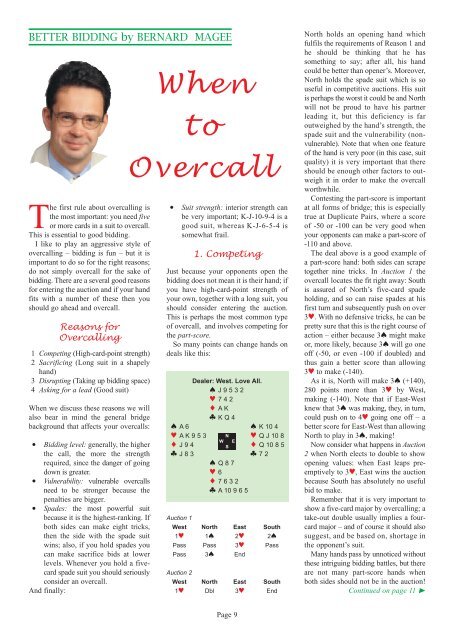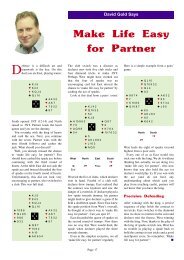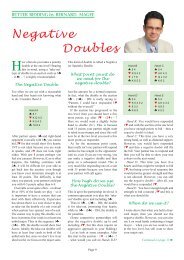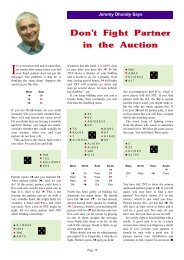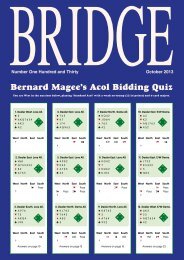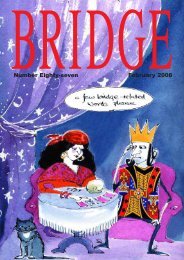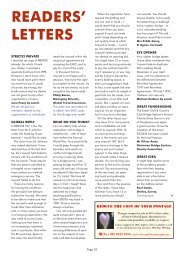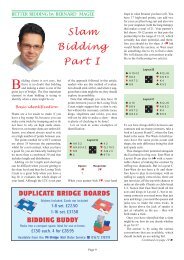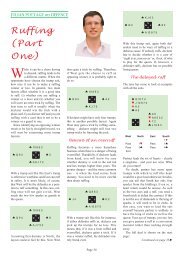When to Overcall - Mr Bridge
When to Overcall - Mr Bridge
When to Overcall - Mr Bridge
Create successful ePaper yourself
Turn your PDF publications into a flip-book with our unique Google optimized e-Paper software.
BETTER BIDDING by BERNARD MAGEEThe first rule about overcalling isthe most important: you need fiveor more cards in a suit <strong>to</strong> overcall.This is essential <strong>to</strong> good bidding.I like <strong>to</strong> play an aggressive style ofovercalling – bidding is fun – but it isimportant <strong>to</strong> do so for the right reasons;do not simply overcall for the sake ofbidding. There are a several good reasonsfor entering the auction and if your handfits with a number of these then youshould go ahead and overcall.Reasons for<strong>Overcall</strong>ing1 Competing (High-card-point strength)2 Sacrificing (Long suit in a shapelyhand)3 Disrupting (Taking up bidding space)4 Asking for a lead (Good suit)<strong>When</strong> we discuss these reasons we willalso bear in mind the general bridgebackground that affects your overcalls:• Bidding level: generally, the higherthe call, the more the strengthrequired, since the danger of goingdown is greater.• Vulnerability: vulnerable overcallsneed <strong>to</strong> be stronger because thepenalties are bigger.• Spades: the most powerful suitbecause it is the highest-ranking. Ifboth sides can make eight tricks,then the side with the spade suitwins; also, if you hold spades youcan make sacrifice bids at lowerlevels. <strong>When</strong>ever you hold a fivecardspade suit you should seriouslyconsider an overcall.And finally:<strong>When</strong><strong>to</strong><strong>Overcall</strong>• Suit strength: interior strength canbe very important; K-J-10-9-4 is agood suit, whereas K-J-6-5-4 issomewhat frail.1. CompetingJust because your opponents open thebidding does not mean it is their hand; ifyou have high-card-point strength ofyour own, <strong>to</strong>gether with a long suit, youshould consider entering the auction.This is perhaps the most common typeof overcall, and involves competing forthe part-score.So many points can change hands ondeals like this:Dealer: West. Love All.♠ J 9 5 3 2♥ 7 4 2♦ AK♣ K Q 4♠ A6 ♠ K 10 4♥ A K 9 5 3 N ♥ Q J 10 8♦ J 9 4W ES ♦ Q 10 8 5♣ J 8 3 ♣ 7 2♠ Q 8 7♥ 6♦ 7 6 3 2♣ A 10 9 6 5Auction 1West North East South1♥ 1♠ 2♥ 2♠Pass Pass 3♥ PassPass 3♠ EndAuction 2West North East South1♥ Dbl 3♥ EndNorth holds an opening hand whichfulfils the requirements of Reason 1 andhe should be thinking that he hassomething <strong>to</strong> say; after all, his handcould be better than opener’s. Moreover,North holds the spade suit which is souseful in competitive auctions. His suitis perhaps the worst it could be and Northwill not be proud <strong>to</strong> have his partnerleading it, but this deficiency is faroutweighed by the hand’s strength, thespade suit and the vulnerability (nonvulnerable).Note that when one featureof the hand is very poor (in this case, suitquality) it is very important that thereshould be enough other fac<strong>to</strong>rs <strong>to</strong> outweighit in order <strong>to</strong> make the overcallworthwhile.Contesting the part-score is importantat all forms of bridge; this is especiallytrue at Duplicate Pairs, where a scoreof -50 or -100 can be very good whenyour opponents can make a part-score of-110 and above.The deal above is a good example ofa part-score hand: both sides can scrape<strong>to</strong>gether nine tricks. In Auction 1 theovercall locates the fit right away: Southis assured of North’s five-card spadeholding, and so can raise spades at hisfirst turn and subsequently push on over3♥. With no defensive tricks, he can bepretty sure that this is the right course ofaction – either because 3♠ might makeor, more likely, because 3♠ will go oneoff (-50, or even -100 if doubled) andthus gain a better score than allowing3♥ <strong>to</strong> make (-140).As it is, North will make 3♠ (+140),280 points more than 3♥ by West,making (-140). Note that if East-Westknew that 3♠ was making, they, in turn,could push on <strong>to</strong> 4♥ going one off – abetter score for East-West than allowingNorth <strong>to</strong> play in 3♠, making!Now consider what happens in Auction2 when North elects <strong>to</strong> double <strong>to</strong> showopening values: when East leaps preemptively<strong>to</strong> 3♥, East wins the auctionbecause South has absolutely no usefulbid <strong>to</strong> make.Remember that it is very important <strong>to</strong>show a five-card major by overcalling; atake-out double usually implies a fourcardmajor – and of course it should alsosuggest, and be based on, shortage inthe opponent’s suit.Many hands pass by unnoticed withoutthese intriguing bidding battles, but thereare not many part-score hands whenboth sides should not be in the auction!Continued on page 11 ❿Page 9
BETTER BIDDING continued from page 92. SacrificingWith weak but distributional hands, ifyou can find a fit, you may well be able<strong>to</strong> find contracts that, although destined<strong>to</strong> fail, enable you <strong>to</strong> give less away thanletting your opponents score game. Theonly way <strong>to</strong> know whether a ‘sacrifice’is possible is <strong>to</strong> bid in order <strong>to</strong> locate afit. A sacrifice will generally be a worthwhileproposition only if your side has agood fit.How can you find out whether youhave a fit? By making an overcall!Dealer: West. E/W Vul.♠ A J 10 5 4 3♥ 7♦ J 10 3 2♣ 4 2♠ 8 ♠ 9 6♥ A K 8 4 2 N ♥ Q J 9 6♦ A8 5W ES ♦ K Q 9 7♣ K 9 7 3 ♣ Q J 5♠ K Q 7 2♥ 10 5 3♦ 6 4♣ A 10 8 6West North East South1♥ 1♠ 3♥ 3♠4♥ 4♠ EndNorth has a very weak hand, but a lot ofplaying strength in spades; when youhold a hand that will take very fewtricks playing in the opposition’s suit,but many in your own, you should thinkof sacrificing – you have an “attacking”HALLMARKEDPENCILSBoxed se<strong>to</strong>f fourin Silver£125alsoavailable in9ct or 18ct goldMail Order ServiceSee centre pageshand. If you play weak jump overcalls,this hand would fit the bill, but withoutthem a simple overcall suffices.With sacrificing in mind you shouldmake an overcall; yes, it is important foryour partner not <strong>to</strong> get <strong>to</strong>o excited,unless he has a fit; if he has a fit withyou, then your hand is a gold mine. Onthis deal North-South will only losefour tricks with spades as trumps, whichmeans that, even if doubled, they willlose just 100 points in 4♠, and 300points in 5♠. With East-West able <strong>to</strong>make 5♥ for 650, both 4♠ and 5♠ area bargain.Big fits (of ten or more cards) are themost suitable for sacrificing; such handscan often take a surprising number oftricks as, with shortages in differentsuits, both hands can make full use oftheir trumps.3. DisruptingWithout opponents’ bids auction are alot simpler, rather like talking one-<strong>to</strong>one.However, try talking <strong>to</strong> someoneacross a crowded room with other voicesand the conversation is a lot moredifficult <strong>to</strong> follow. The same is true inbridge: put in a bid at the right time andyour opponents will have a <strong>to</strong>ugh timeof it. Over 1♣, 1♠ is very disruptive,taking up the whole of the one level. Incontrast, a 1♥ bid over 1♦ causes littledisruption: with you holding length inhearts, your LHO was unlikely <strong>to</strong> want<strong>to</strong> bid 1♥ anyway.Dealer: West. Love All.♠ A K 5 4 3♥ J 3 2♦ 8 7 4♣ 6 5♠ 8 7 ♠ 9 6 2♥ K Q 9 4 N ♥ A 10 8 6♦ J 6W ES ♦ Q 10 5♣ A Q J 8 2 ♣ K 4 3♠ Q J 10♥ 7 5♦ A K 9 3 2♣ 10 9 7Auction 1West North East South1♣ 1♠ Dbl 2♠. . .Auction 2West North East South1♣ 1♠ Pass 2♠. . .Auction 3West North East South1♣ Pass 1♥ Pass2♥ EndNorth’s hand is not strong, but in everyother respect it is perfect for an overcall:good suit, a great lead, the spadesuit, and the overcall takes up the wholeof the one level – forcing East <strong>to</strong> bidhigher <strong>to</strong> show his hand. The 1♠ overcallblocks the simple 1♥ response.East can use the negative double <strong>to</strong>show four hearts (if he plays theconvention), but is West strong enough<strong>to</strong> bid over 2♠?This deal is very similar <strong>to</strong> the firs<strong>to</strong>ne, in that it is a part-score battle, butby bidding obstructively you mightmanage <strong>to</strong> s<strong>to</strong>p your opponents findingtheir fit, and by bidding spades up <strong>to</strong> thetwo level in one round of bidding youcertainly make it difficult for them. If youdo not use the negative double, whatwould you bid on the East hand after 1♣– 1♠? Not easy, is it? All of this troublecaused by a simple 1♠ overcall!East-West can make nine tricks inhearts whilst North-South can make eighttricks in spades. Once again if East-West do manage <strong>to</strong> reach 3♥, North-South will do better <strong>to</strong> finish in 3♠,losing 50, which is better than givingaway 140. The intricacies of part-scorehands at Duplicate Pairs are endless;start winning these types of hand and youwill soon see your scores jumping up.Something that becomes apparent veryquickly when studying overcalls andpart-score hands is that spades are avery powerful suit – good for barragingand good for sacrificing.4. Asking for a LeadPerhaps the most important reason forovercalling is <strong>to</strong> tell partner what <strong>to</strong>lead. Suits such as ♠A-K-4-3-2 and♥K-Q-J-10-9 are crying out <strong>to</strong> be led,but if you are not on lead how can yoube sure <strong>to</strong> have them led? By overcalling!The first rule we are taught indefence is: “Lead your partner’s suit.”This should severely sway youagainst overcalling on weak suits.Generally the stronger your hand, theContinued on page 13 ❿Page 11
BETTER BIDDING continued from page 11weaker the suit can be (as we saw in thefirst example); thus any weak overcallshould be based around a very strongand long suit.Dealer: South. N/S Vul.♠ 8 7♥ A 8 6 2♦ A5 2♣ K Q 9 8♠ K 2 ♠ 10 9 5 4♥ K Q J 10 9 N ♥ 4W E♦ 9 8 7 6 S ♦ K Q 10 4♣ 7 6 ♣ 5 4 3 2♠ A Q J 6 3♥ 7 5 3♦ J 3♣ AJ 10Auction 1West North East South1♠2♥ 3NT EndAuction 2West North East South1♠Pass 2♣ Pass 2♠Pass 3NT EndWith the vulnerability favourable, 2♥ isnot really that dangerous, especially asit will almost always help the defence.We do not know who is going <strong>to</strong> bid3NT, but if it is North we must makesure our partner knows what <strong>to</strong> lead. OnAuction 2 above, West will surely leadthe king of diamonds; when the spadefinesse loses, East-West will make theirdiamond tricks, but that is not enough:four tricks and declarer makes his nine.However, after Auction 1, partner is sure<strong>to</strong> heed your call and lead the four ofhearts, after which declarer will struggle<strong>to</strong> get home: the spade finesse will stilllose, but this time the defence will makefive tricks because they started with theright suit. Even if declarer aims for somekind of endplay, West can still foil himwith accurate defence.Notice that because of the solidity ofyour suit, even if partner only turns upwith 5 points and a double<strong>to</strong>n heart, youstill have a good chance of making 2♥(perhaps with four hearts, three diamondsand a spade). Yes, best defence will foilyou, but then the risk of reaching an unmakeablecontract was certainly outweighedby the ability <strong>to</strong> tell partner what<strong>to</strong> lead.Beware as ResponderIn general I advocate overcalling asoften as possible, but think about thereasons why – do not just call for thesake of calling; remember that youropponents can listen <strong>to</strong>o, and can gainimportant information with regard theplay of the hand. I have outlined thereasons for overcalling rather than givingstrict guidelines; this is because there areso many different hands on which it canbe right <strong>to</strong> overcall, that you cannot fitthem all in one box.Notice, however, that since I advocatesome very weak overcalls, when responding<strong>to</strong> an overcall you do need <strong>to</strong> bemore wary. What this means is that youneed <strong>to</strong> make use of the opponents’ suit<strong>to</strong> show a strong hand, e.g. 1♣ – 1♠ –Pass – 2♣ (the last bid saying: “Partner, Iam strong”) rather than leaping <strong>to</strong> 3NT!This situation will be cleared up whenwe consider responding <strong>to</strong> an overcallin a future article.■SUPERSCORERDuplicate <strong>Bridge</strong> Scoring Programfor Windows 95 or laterSingle or multi section/session ♦ Any movement scoredEnter names using initials ♦ Prints Master-pointsUploads Sim Pairs results ♦ Creates HTML filesFrom theMail Order Service. See centre pages.£52 95inc p&pBernard Magee’swidely acclaimedACOLBIDDINGSOFTWARECONTENTS(20 HANDS EACH) Opening Bidsand Responses No-trump Openings Support for Partner Slams and Strong Openings Opener’s andResponder’s Rebids Minors and Misfits Pre-empting Doubles <strong>Overcall</strong>s Competitive AuctionsSYSTEM REQUIREMENTS Windows 95 or later CD-ROM£59 95A ProductAvailable exclusively from theMail Order ServicePage 13


